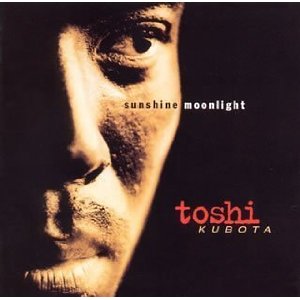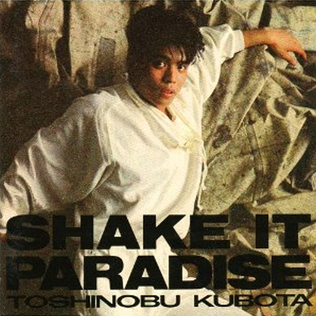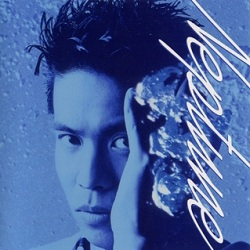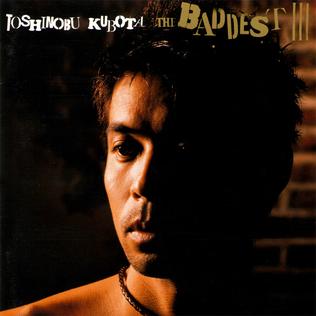Toshinobu "Toshi" Kubota is a Japanese singer, songwriter, musician, music producer, and radio personality. He has produced six million-seller records and thirty-three Top 40 singles during his career. Kubota is currently part of Sony Music Japan. In addition, he has composed and written songs for many singers including Hiromi Iwasaki, Misia, Toshinori Yonekura, Kyōko Koizumi, and many other recording artists.

"Flying Easy Loving Crazy" is a song recorded by Japanese singer-songwriter Toshinobu Kubota and Japanese singer Misia for Kubota's fifteenth studio album Timeless Fly. It was released by Mastersix Foundation as the album's second single on March 26, 2008.

Sunshine Moonlight is the eighth studio album of Japanese singer Toshinobu Kubota, released on September 5, 1995. The album credited under the name, Toshi Kubota. This was also Kubota's first English-language album. The album's musical style ranges from 1980s–90s R&B and pop to funk elements such go-go. Synth instrumentation was not employed in recording most of the song as the album contains live instrumentation.
The discography of Japanese R&B singer Toshinobu Kubota consists of nineteen studio albums, ten compilation albums, two tribute albums, and over seventy singles. In 1985, Kubota signed with Sony Japan and began producing and writing songs for many of label's singers and groups. Under the label, Kubota released his first single, "Shitsui no Downtown" in June 1986, followed by "Time Shower ni Utarete" in December. Both songs were well received by radio, placing fifty-three and thirty-five on the Oricon Singles Chart. In September 1986, his debut album, Shake It Paradise, peaked at number twenty-two and remained on the Oricon Albums Chart for seven consecutive weeks. Shake It Paradise became certified million. The following year in 1987, Kubota's second studio album, Groovin', debuted at number thirty-three and was certified million. In February 1988, Kubota released "You Were Mine", which debuted at number two. In September 1988, Kubota released his third album, Such A Funky Thang!. The album peaked at number one and was certified million. The album also spawned the top-charted single "Dance If You Want It", which peaked at number three. In 1989, Kubota released his compilation album, The Baddest. The album also peaked at number one and was certified million.

Shake It Paradise is the first studio album of Japanese singer Toshinobu Kubota, released on September 10, 1986. Under the label, Kubota released his first single, "Shitsui no Downtown" in June 1986, followed by "Time" in December. Both songs were well received by radio, placing fifty-three and thirty-five on the Oricon Singles Chart. "Shake It Paradise" peaked at number twenty-two and remained on the Oricon Albums Chart for seven consecutive weeks. Shake It Paradise became certified platinum.

Groovin' is the second album by Japanese singer Toshinobu Kubota, released on April 22, 1987. The album peaked at number 33 on the Oricon Album charts, and sold over a million copies, becoming a certified Million. Following the release of the album, Kubota went on "Keep On Dancing Tour", and later released the concert DVD Keep On Dancing.

The Baddest is first compilation album of Japanese singer Toshinobu Kubota, released on October 8, 1989. The album peaked at number one and was certified million.

Bonga Wanga is the fourth studio album of Japanese singer Toshinobu Kubota, released on July 15, 1990. Under the label, Kubota released his first single, "Be Wanabee" in October 1990, followed by "Mama Udongo" in March 1991. The lead single "Be Wanabee" charted at number 16 on the Oricon Weekly Singles chart. "Bonga Wanga" became Kubota's first album to peak number one on the Oricon Albums chart. The album also became certified million. That album contains several English lyrics.

"La La La Love Song" is a song recorded by Japanese R&B singer Toshinobu Kubota for his ninth studio album, La La La Love Thang (1996). The song was written by Kubota and produced by Yoichiro Kakizaki.

Kubojah: Parallel World I is the fifth studio album of Japanese singer Toshinobu Kubota, released on September 21, 1991.

Neptune is the sixth studio album by Japanese singer Toshinobu Kubota, released on July 1, 1992. The album charted at number 3 on the Oricon Monthly Albums chart and remained on the charts for total of 13 weeks. The album sold a total of 484,000 units, reaching double platinum certification.

Bumpin' Voyage is the seventh studio album of Japanese singer Toshinobu Kubota, released on January 28, 1995. The album charted at number 1 on the Oricon Albums chart and remained on the charts for total of 12 weeks. The album sold a total of 600,000 units, reaching double platinum certification. In September 1995, Kubota re-recorded most of the album into English language and released the material on his eighth studio album Sunshine, Moonlight.

Gold Skool is the sixteenth studio album of Japanese singer Toshinobu Kubota, released on August 3, 2011. The album charted at number 3 on the Oricon Albums chart and remained on the charts for total of 18 weeks. The album sold over 78,124 units in Japan.

Timeless Fly is the fifteenth studio album of Japanese singer Toshinobu Kubota, released on February 24, 2010. The album charted at number 9 on the Oricon Albums chart and remained on the charts for total of 26 weeks. The album sold over 16,063 units in Japan.

The Baddest II is a compilation album of Japanese singer Toshinobu Kubota. The album released on September 22, 1993, summing up various singles from Kubota. The album peaked at number one and spent twenty-three weeks on the Oricon Weekly Albums chart. The album became certified triple platinum, selling over 791,000 copies in Japan.

The Baddest III is a compilation released by Japanese singer Toshinobu Kubota, on December 4, 2002. The album charted at number 3 on the Oricon Weekly Albums chart and stay on the charts for a total of eighteen weeks. The album also sold over 316,000 units in Japan.

The Baddest: Hit Parade is a compilation released by Japanese singer Toshinobu Kubota. This album was released in Japan at the end of November 2011 to commemorate the twenty-fifth anniversary of Kubota's music. The album charted at number 2 on the Oricon Weekly Albums chart and remained on the charts for a total of 38 weeks. The album became certified platinum, selling over 351,049+ units in Japan.

"Nagareboshi to Koi no Ame" is a song recorded by Japanese R&B singer Toshinobu Kubota for his sixteenth studio album, Gold Skool (2011).

"Love Rain (Koi no Ame)" is a song recorded by Japanese R&B singer Toshinobu Kubota for his compilation album, Love & Rain: Love Songs (2010). The song was released on June 6, 2010, as the lead single from the album.

Timeless Fly Tour was the concert tour by Japanese singer-songwriter Toshinobu Kubota in support of his fifteenth album Timeless Fly.


















